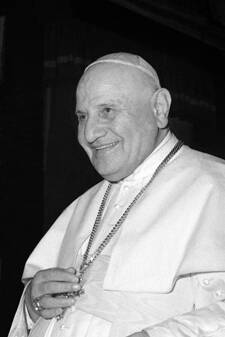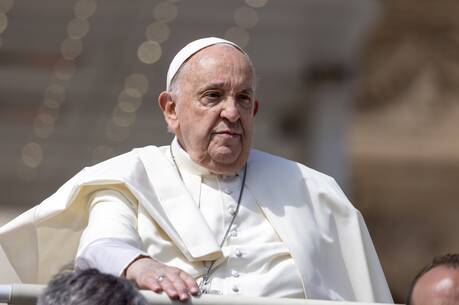With Pope John's announcement that the Second Vatican Council would begin on October 11, the interest of the American bishops visibly quickened. Among other moves, two archbishops have produced important pastoral letters about the council.
The first, Most Rev. Edward D. Howard, Archbishop of Portland, Ore., entitled his document "The Second Council of the Vatican and Our Separated Brethren: Agreements, Difficulties, Possible Contributions" was pubiished in the March 8 issue of the Catholic Sentinel, weekly newspaper of the Portland Archdiocese.
Archbishop Howard looks to the council for development of doctrines set forth in Pope Pius XII's encyclilcals on the Mystical Body and the liturgy. He hopes the council will bring Church law up to date, for "in this field the council can do much to make union easier for our separated brethren." Foreseeing that the work of Christian union will be a long one, the Archbishop recommended establishment of diocesan, national and international commissions to apply the guiding principles that will be laid down by the council. He announced he would set up one of these commissions, a "Committee on Religious Unity," for his archdiocese.
The second Archbishop, Richard Cardinal Cushing, of Boston, entitled his document "The Call of the Council." It is one of the most useful and rewarding publications, and certainly the most authoritative, about the council to have appeared to date in this country.
Cardinal Cushing expects that the coming council will clarify and strengthen all aspects of the renewal of Christian life that is already in progress. In addition to delineating "with new insight" the position and authority of bishops, the council will "enunciate with a new clarity the 'dignity of the lay life, the vocations involved in it and the essential role the layman plays in the full life of the Church." The Cardinal insists that the laity, along with the members of the hierarchy, are "co-responsible for the Church" (emphasis in text).
In this pastoral letter, as in its well-known forerunners ("Moral Values and the American Society," 1960, and "The Christian and the Community," 1960), the Cardinal is preoccupied with the problem of "people living as Christians without thinking as Christians." In this context he writes that we must expect to see the Church's adaptation of liturgical discipline to modern man and contemporary society extended by the council. "We might well expect to see," he says, "some adaptations in the language and liturgical ceremonies as celebrated in the churches of Africa and Asia, whose cultures are different from what we call Western civilization." We must continually reappraise our mission methods so as to make identification of the Church with colonialism impossible in the future, but, he adds, we are to expect changes and adaptations at home, too.
The Cardinal faces the fact that the percentage of those receiving higher learning is growing. The fact, he says, requires compensating steps on the part of the Church to assure knowledge of the faith proportionate to this intellectual development. Can we suppose, the Cardinal asks, that parish organizations whose origins date from the last century, and earlier, continue to be effective in contemporary society? Recent findings in social science, he points out, can guide many developments in the ordering of parish life. He hopes the council will provide practical counsels "from which our own zeal will structure new forms of parish life" to meet new challenges successfully. The Cardinal announced he will convoke a synod soon after the close of the council for these purposes.
"Union is prepared and effected not only in ecumenical councils; it is born and grows in the pluralistic neighborhood." With this statement the Cardinal announced he will form an "Archdiocesan Ecumenical Committee" of priests and laymen.
Both Cardinal Cushing and Archbishop Howard urge charity and the setting of good example, fraternal collaboration with our separated brethren in areas where Catholic doctrine is not directly in question, theological conversations among specialists, prayers on the part of all for the council and for Christian union. Their plans and endorsements will surely hearten both Catholics and non-Catholics throughout the country.









Hey, Jude... don't make it bad...
Boy, is the Council in the mind of the beholder also....
Would that there were bishops with such enthusiasm today... most, think, are in Jude's camp.
Comments 1 and 2 say it all as far as where the Church stands today, pro and con. Cardinal Cushing and Good Pope John XXIII were attempting to bring the church into the 21st century. It is remarkable that one change has actually has taken root....ecumenism! Since I am 86 I have had a front row seat in viewing change and revocation of change. I have witnessed it personally and especially enjoy discussion with my Hindu and Buddhist friends.
I never realized what a wonderful person Cardinal Cushing was. Thanks to America Magazine, this is so very apparent in four major points that he recognized: 1) that the percentage of those with higher learning is growing, 2) recognition that "Union is born and grows in a pluralistic neighborhood" (and announcing that he would form an Archdiosesan Ecumenical Committee of Priests and Laymen) *, 3) the Cardinal insisted that the laity, along with the members of the hierarchy, are co-responsible for the church (emphasis on co-responsible) and 4) the Cardinal had a problem of "people living as Christians without thinking as Christians." * I was a beneficiary of this thinking. In 1983 I had drifted away from the Church for, among other reasons, disenchantment with the hierarchy. I was unaware that I was being prayed for by a men's Ecumenical Prayer group at Martin Marietta where I was employed. How well this worked is another story.
I have two reasons for pointing out the above. One, this was new thinking, not at all what was taught in the 1930s, 40s and 50s. Some of it has seeped into "thinking" Christians but more could have been done since 1960. Sadly, we are backtracking. However, the door has been opened and will not be fully closed. At 86, gladly, I can say we are better today (especially as "thinking Christians"), thanks to Vatican II, Pope John XXIII, Cardinal Cushing and Archbishop Howard. AND, America! Would that I could have had a Jesuit education.
Eileen
especially enjoying discussions with Buddhist and Hindu